
Whether you’re booking your first external audit or looking to recertify for Certificate of Recognition (COR™), finding the right auditor should be a key step in your process.
Careful selection of your external auditor can help to ensure the experience is a positive one. Finding the right fit with an auditor ensures your team can continue the momentum you’ve built internally and help you to achieve your certification on time.
Below are five things you need to know before selecting your auditor:
1. All external auditor charges are reviewed by IHSA
In Ontario, the Infrastructure Health and Safety Association (IHSA) is responsible for administering the COR program. This includes screening and training COR auditors (aka Associate Auditors by IHSA) to ensure their representatives are competent in auditing to the COR standard. In addition to training, all rates are overseen by IHSA for external audit services.
As the COR Certification authority in Ontario, IHSA sets the maximum allowable day rate for external auditors. In addition to standardizing our rates as Associate Auditors, IHSA also requires all estimates to be reviewed by their team even before an audit begins and when any out of scope changes occur.
The process receives a high degree of oversight and protects COR applicants. This regular review ensures auditors are effectively auditing COR relative to the number of employees, worksites and work types for each organization.
2. You can ballpark your external audit costs based on the internal audit
To estimate the total amount of days your External Auditor will require, we recommend using your experience with the internal audit for guidance.
Auditor fees will vary, on average, between $1000-1200 per day, in services alone. By multiplying the number of days you spent conducting the internal COR audit (include time for planning and report writing), you can begin to develop a sense for how much you will need to spend:
Example: 5 day internal audit x $1,200 per day = $6,000
You’ll also need to include some buffer for any charges related to mileage, meals and overnight accommodation (if this is needed for your work sites – be sure to ask, as this can vary).
If your organization is one that likes to get into the gritty details of staff time expenditure to support the completion of the COR audit, be sure to include any relevant hours in here.
An experienced external auditor will be able to help you develop a timeline and understand any dependencies. Having this information up front can go a long way to educate internal stakeholders about deadlines. Having critical staff away on vacation when the external audit is scheduled can happen! If this is your first time coordinating an external audit, let your auditor know and they will be able to provide you with guidance on what to look out for.
3. It is possible to get a more competitive estimate
Although IHSA sets a standard daily rate, there will be some variation in audit costs and you are encouraged to seek competitive bids. A portion of the Associate Auditors on the IHSA list focus solely on conducting COR audits, while others provide specialist safety consulting services in addition to external audits for COR. This may be important for you to know, be sure to ask.
In addition to the day rate that can vary, auditors can have a different approach to expenses too. Some estimates may not require mileage or accommodation costs if an auditor is located close to your work sites.
If your safety records and documents allow for a digital review, an auditor may suggest conducting this part of the audit from their office (or home). This can reduce their costs to be onsite, however, each estimate will treat any offsite work by your auditor differently.
4. Avoid scope creep by researching who you work with upfront
Like all things in life, you get what you pay for. If you receive an estimate that seems too good to be true, that might be because it is!
While most estimates will likely be close in cost due to the standardized nature of the process, the biggest difference you can expect to see is between each auditor’s approach, interview style, industry knowledge and experience with the COR program.
No one likes to find out there are additional costs during the audit, but this is something that can happen so it’s important to be prepared. In the event that the scope of the external audit changes, your auditor will prepare another estimate and send this over again to IHSA for review. This review will take time and may impact your original timeline for certification – Your auditor should be able to walk you through this so that you can plan accordingly and let your stakeholders know. Before agreeing to work with an external auditor, be sure to ask how they’ve worked with previous COR applicants when a change in scope has occurred.
5. An experienced auditor will save you time and money
It pays to do some research before choosing your external auditor in addition to booking their services ahead of time. An experienced auditor that’s familiar with your industry will quickly know what’s relevant to COR, and what isn’t critical to the audit. This experience can be crucial to obtaining your certification on the schedule that you’ve committed to internally.
Don’t go it alone! Reach out if you have questions. There are a wide range of Associate Auditors with experience relevant to your industry. With some research, the right auditor can help you to have an enjoyable and smooth audit experience that will have the rest of your business relieved to have COR in the workplace. While COR can be an involved process, the results ultimately make for a safer, more standardized, and cooperative work environment.


